Table of contents of
the page
 A
brief biography of the
composer
Bortniansky (Dmitro Bortnjanskij, Dmitri Bortnjansky)
see below
A
brief biography of the
composer
Bortniansky (Dmitro Bortnjanskij, Dmitri Bortnjansky)
see below
 Text of the book about
Bortniansky (by
Konstantin Kovalev) - in Russian
see below
Text of the book about
Bortniansky (by
Konstantin Kovalev) - in Russian
see below
 Few words about the author of
the book - K.Kovalev ›››
Few words about the author of
the book - K.Kovalev ›››
 Some stories about this book,
its creation and around publication of the book for the first time
Some stories about this book,
its creation and around publication of the book for the first time
in the USSR (why it was impossible long time for the
"Soviet Youth") ›››
 Usual mistakes in the biography
of the composer (on present time)
›››
Usual mistakes in the biography
of the composer (on present time)
›››
 About biography of
Bortniansky - in Japanese ›››
About biography of
Bortniansky - in Japanese ›››
 All about Bortniansky's
famous
hymn "Kol slaven" ("How Glorious is Our Lord")
see below
All about Bortniansky's
famous
hymn "Kol slaven" ("How Glorious is Our Lord")
see below
 Some articles about
Bortniansky (and his epoch) by
Konstantin Kovalev -
in English
›››
Some articles about
Bortniansky (and his epoch) by
Konstantin Kovalev -
in English
›››
* * *
"Bortniansky": book in a series
"Life of outstanding people"
Konstantin Kovalev
(Kovalev-Sluchevsky)
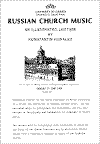 A
biography of one of the most prominent of Russian composers of church music.
This is a readable account of the composer's life, based on scholarly
research but intended for the general reader as well as those who are
already connoisseurs of Russian choral music.
A
biography of one of the most prominent of Russian composers of church music.
This is a readable account of the composer's life, based on scholarly
research but intended for the general reader as well as those who are
already connoisseurs of Russian choral music.
Russian church music has always aroused
interest in the West, and in the nineteenth century Russian choirs travelled
all over Europe and America. But until recently, comparatively little has
been known of the music of the eighteenth century. The most notable composer
of this period was Dmitry Bortniansky (1751-1825), the author of a
well-known "Liturgy", of the "All Night Vigil" and of the famous hymn "How
Glorious is Our Lord" which was for a long time the Russian national anthem,
played the chimes of the Kremlin's Spasskaya Tower.
Bortniansky also wrote operas and cantatas, symphonies and chamber music. He
travelled outside Russia and lived in Italy for ten years, In New York there
is a monument to him in one of the city's cathedrals and he was celebrated
in the grand style in Paris with his works performed by a choir of two
thousand voices.
The book is illustrated with virtually all the portraits and other pictures
surviving which relate to Bortniansky's life and career. The book reflects
Russian and European cultural life at the end of the eighteenth century, and
illustrates, through the composer's career the major changes and
developments taking place in the music, especially the choral music of the
Russian church.
The author
many years worked in domestic, foreign archives and libraries for collecting
materials for a spelling of the books about brilliant Russian composer Dmitry Bortniansky, about starting point and development of Russian musical
culture of 18th centuries. These books were published in different time. The
book about Bortniansky and his epoch was published in a series "Life of
outstanding people" (ZSL) by two editions (mass editions), translated into on
foreign languages (unfortunately it’s not translated yet to the English).
Now it is one of the main and capital works about the composer. Life of
Russian of 18th century composer introducing Bortniansky and the
achievement. Hiding in the shade of the masters of 19 centuries, it
approaches to the real image of the musician who is not known excessively,
searches the music circumstance of that time and the source of the Russian
theology. However even earlier the manuscript ready for printing some years
was not resolved for the edition in series ZSL (a special mass series for
the Soviet youth). Composer’s creativity was considered dangerous to the
Soviet readers because was too "spiritual". Even well-known spiritual church
chanting of the composer the children's chorus sang with new "secular" words
(not about the God, and about "the clear sun in the sky...", and so on).
On this page the information on Bortniansky and around his name, also a
history of preparation and issue of the K.Kovalev’s book and its subsequent
destiny is collected.
Text of the book: "Bortniansky" (by Konstantin Kovalev)
Russian
-
HERE
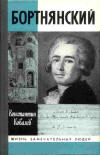
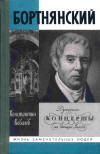
Reproduced
under edition:
Konstantin Kovalev. Bortniansky.
Second edition.
- Moskva: "Molodaia gvardiia"; "Russkoe slovo", 1998.
- 271 p., illustr.
- [Zhizn zamechatelnykh liudei (Life of
outstanding people).
Vol. 748 (701)]. ISBN 5-235-02308-0.
See also:
Konstantin Kovalev. Bortniansky. First edition. -
Moskva: "Molodaia gvardiia", 1989. - 304
p., illustr. - [Zhizn
zamechatelnykh liudei (Life of outstanding people). Vol. 748
(701)]. ISBN
5-235-00681-X.
A brief biography
of the Bortniansky (Bortnjanskij, Bortnjansky)
Bortniansky Dmitry Stepanovich (1751-1825)
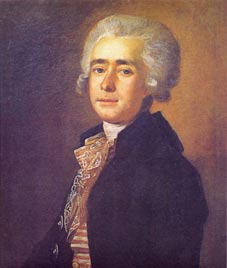 Russian
composer, studied with Galuppi in St. Petersburg and Venice. After producing
two operas in Italy, in 1779 he returned to St. Petersburg. There, in 1796,
he became director of the Imperial Chapel Choir, for which he set a high
standard. He wrote mainly church music, combining Russian church style and
Italian style. In 1881, Tchaikovsky completed an edition of his church
music, published in 10 volumes.
Russian
composer, studied with Galuppi in St. Petersburg and Venice. After producing
two operas in Italy, in 1779 he returned to St. Petersburg. There, in 1796,
he became director of the Imperial Chapel Choir, for which he set a high
standard. He wrote mainly church music, combining Russian church style and
Italian style. In 1881, Tchaikovsky completed an edition of his church
music, published in 10 volumes.
The Columbia Encyclopedia, Sixth
Edition. 2001-05.

A wealth of glorious treasures, a magnificent bounty was left to us by the
exuberantly generous, incredibly talented Russian musical 18th century.
St.Petersburg… The glittering capital of 18th century Russia… The first
Russian operas, small, but priceless gems – “Russian songs”, published in
St.Petersburg in the mid-18th century, destined to speedily enchant all of
Europe with their artless beauty, the birth of powerful instrumental music –
a sensation, worthy of being entered into the Guinness Book of Records! The
18th century became an acknowledged summit in the evolution of Russian
church music, the result of eight centuries of existence of this most
ancient music genre in Russia.
The brilliant Russian composer Dmitry Bortnyansky… In just a matter of
several dozen years ago, this name was almost the only one among the names
of Russian composers of the 18th century which was familiar and acknowledged
by the music world. What a remarkable paradox of history this is: the
astoundingly rich, opulent Russian musical 18th century, which, in its time,
had roused, with its exuberance and freshness, all of musical Europe – and
then almost two centuries of oblivion for Russian art of that period. Many
of Bortnyansky’s compositions are sensational discoveries, made in the
second half of the 20th century, and one of the most generous sources of
these are the archives of the St.Petersburg palaces.
Just several dozen years ago we were familiar with Dmitry Bortnyansky
exclusively in the capacity of church composer. However, we are now wise to
the fact that Bortnyansky authored over two hundred opuses, a major part of
which are secular! To begin with, he acquired recognition as an opera
composer. Incidentally, this fame began to take hold in Italy, where
Bortnyansky studied for ten years. Later, he became court composer in the
times of Catherine the Great. Still later, he worked at two courts: that of
the Empress, and at the “minor court” – of the future heir Pavel.
All of Bortnyansky’s instrumental chamber music is written specifically for
the minor court – for concerts at the Pavlovsk palace, the environs of
St.Petersburg. Among those who performed his music, were, traditionally, the
royalty themselves. For example, Pavel’s wife, Maria Fyodorovna, was quite
an appreciable harp player…
Russian instrumental music of the 18th century is, perhaps, one of the most
fascinating pages in the “history” of Russian music. After all, Russia is,
traditionally, a vocal country. Of course, this doesn’t mean Russians didn’t
have music instruments, but prior to the 18th century, these were
exclusively folk. Throughout the entire period before that, professional
art, in the course of some eight centuries, was strictly limited to the
sphere of Russian church choral music a’capella.
At the beginning of the 18th century, Russian art embarked on a vibrant
dialogue with Europe – as a result of which foreign “guests” ventured to
make their way here – the clavichord, flute, French horn, cello…
It might seem practically inconceivable, but in under a century, Russia
developed its own national instrumental school! This music doesn’t require
condescending concessions due to time factor… And instrumental music of
Maxim Berezovsky, another revelation of the 18th century which emerged just
recently, is another proof to it. For two centuries nobody had an inkling of
its existence, and Berezovsky was remembered, but vaguely, as a choral
composer.
In the 18th century St.Petersburg and all of Russia were experiencing a
musical boom. Quite a commendable fashion of the day, you have to agree:
practically every person played at least some kind of music instrument.
Moreover, believe it or not, but a great many people wrote music just for
themselves. Listening to it, one can successfully gauge the general cultural
atmosphere of the time...
The Voice of
Russia
All about Bortniansky's hymn "Kol slaven" ("How Glorious is Our Lord")
The well-known hymn -
"Êîëü ñëàâåí" ("Kol slaven"
or "How
Glorious is Our Lord in Zion"; considered up to now as the Hymn of
Russian emigration) was written by the composer with the text of poet M.M.
Heraskov - at the end of XVIII century (version - 1822). Printed notes of this hymn are
known.
Some time was considered as formal national hymn of the Russian state
(served for a considerable time as the national anthem of the Russian
empire). It was frequently executed in public places and at assemblies.
The
hymn also was very popular outside Russia.
In XX century the Hymn was
executed with choruses of Russian emigration. Sometimes the melody sounded
in performance of orchestras. Record of Russian emigrants (the rare
edition), execution of the Hymn by an orchestra under A.A.
Skrjabin's management and under protection of Association
Russian Imperial Horse Guards and Horse Artillery in Paris (1950-th) is
known.
The tune composer wrote for a hymn popular with freemasons, traveled to
English speaking countries and came to be known by the names Russia, St.
Petersburg or Wells; in Germany, the song was paired with a text by Gerhard
Tersteegen
(1697-1769; from one of his hymns), and became a well-known chorale and traditional closing piece to
the military ritual Großer Zapfenstreich (the Ceremonial Tattoo).
Original German text:
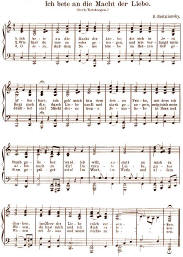 Ich bete an die Macht der Liebe,
Ich bete an die Macht der Liebe,
Die sich in Jesu offenbart;
Ich geb' mich hin dem freien Triebe,
Mit dem ich Staub geliebet ward.
Ich will, anstatt an mich zu denken,
Ins Meer der Liebe mich versenken.
Wie bist du mir so zart gewogen,
Und wie verlangt mein Herz nach dir;
Durch Liebe sanft und stark gezogen,
Neigt sich mein Alles auch zu dir!
Du traute Liebe, gutes Wesen,
Du hast mich und ich dich erlesen.
O Jesu, daß dein Name bliebe
Im Herzen tief gedrücket ein!
Möcht deine treue Jesusliebe
In Herz und Sinn gepräget sein!
Im Wort, im Werk und allem Wesen
Sei Jesus und sonst nichts zu lesen.
Prior to
the October revolution in 1917, the tune was played by the Moscow Kremlin
carillon (in bell tower) every day at 15 o'clock and at 21 o'clock exactly.
James Benjamin Blish (an American author of
fantasy and science fiction), who novelized many episodes
of the original series of Star Trek, noted in one story, Whom Gods Destroy,
that Bortniansky's "Ich bete an die Macht der Liebe" was the theme to which
all Starfleet Academy classes marched to their graduation.
Konstantin Kovalev-Slushevsky
More
in Russian about hymn ›››
(The text is written for publication)
• • •
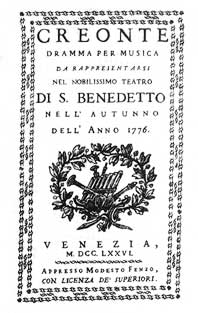
The Title
of the printed libretto of Bortniansky's opera "Creonte".
The opera's premiere took place in Venice
(theatre "San Benedetto", 1776).
